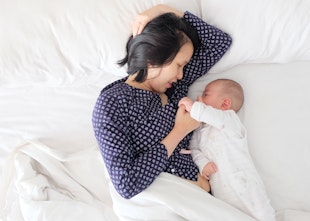Having difficulties getting your child to sleep? Our expert gives us some insights as to why this might be happening.
Does your child wake frequently during the night? Is your doctor happy that there is no medical reason as to why your child is waking? Does your child generally eat well, (albeit during the night in some cases)?
If the answer to these questions is yes then your child most likely has a negative sleep association.
What is a sleep association?
A sleep association is something your child relies on to help him or her sleep. There can be positive and or negative sleep associations. A positive association is something that your child can do for herself. For example, his or her cot, pj’s, blankets are all positive associations, as these are all constants for your child, he or she doesn’t need these to be replaced during the night. If your child was to wake during a night’s sleep he or she will still have easy access to these items.
A sleep association is something your child relies on to help him or her sleep. There can be positive and or negative sleep associations. A positive association is something that your child can do for herself. For example, his or her cot, pj’s, blankets are all positive associations, as these are all constants for your child, he or she doesn’t need these to be replaced during the night. If your child was to wake during a night’s sleep he or she will still have easy access to these items.
A negative sleep association however is when a child is dependent on someone doing something to help him or her sleep. Examples of negative associations are being fed to sleep, rocked to sleep, someone sitting with them until they fall asleep, soothers if he or she is not old enough to be able to put it back into his or her own mouth or mobiles if they can’t switch these on themselves. In each one of these negative association scenarios your assistance is required.
A child will naturally rouse at different times during the night. Generally a child will take about 30 minutes to fall into a deep sleep and then remain in that sleep for approximately 3 hours. After a deep sleep period your child will then frequently change from one sleep cycle to the next, this could happen, half hourly, hourly and so on depending on the child. When a child goes from 1 sleep cycle to the next they change from deep sleep (non-rem) to light sleep (rem) and during each stage he or she will rouse. If your child senses something has changed in their environment, they will wake needing whatever has changed to be put back in place. For example, if your child falls asleep on you he or she will rouse looking for you and needing you to help with their return to sleep again or if you were sitting beside them until they fall asleep, they will expect you to be there when they wake. If your child’s environment is constantly changing from when they go off to sleep to when they wake up, they will be very unsettled right throughout the night. Even if you then end up staying with them they may still rouse frequently checking that nothing has changed again!
Put yourself in your child’s shoes. If you were to fall asleep with your child in your arms, when you change sleep cycles during the night you will sense if he or she is not there. This will cause you to wake anxiously wondering where he or she is gone. Naturally you won’t be able to relax until your child is back in your arms and even when they are you will find it difficult to return to sleep. Once you eventually do you will most likely wake many times during the night to make sure your child is still there.
An even simpler scenario would be if your pillow fell out of the bed, you would rouse later during the night and sense it was gone and replace it.
For a child to sleep soundly, their environment must stay the same. If your child has a negative sleep association it is important to change it so that they can learn how to settle, and resettle themselves, without any assistance from you.






